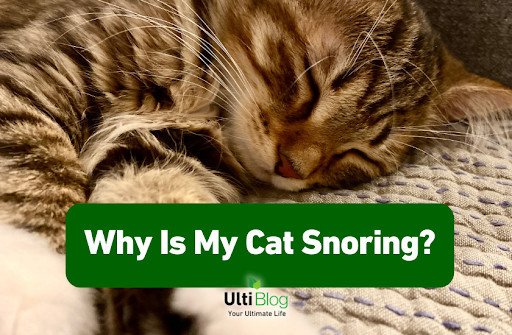views
Why Is My Cat Snoring?

Do you know the sound of a content cat? It's usually a pretty soothing noise, but sometimes that purring can be accompanied by odd snoring or wheezing.
So what's going on there? Why is my cat snoring? Is it something to worry about? Let's take a look at what might be causing your feline friend to make these strange sounds and how you can help them get relief.
How for more in-depth explanations, read Reasons for Cat Snoring and What You Can Do About It for more tips.
Facial Shape
One of the most common reasons for cat snoring is simply due to their facial structure. Cats have long, thin faces and noses, which can cause their airways to be narrower than other animals. This can lead to a condition called brachycephalic airway syndrome (BAS), which means they have trouble breathing properly.
Some cat breeds, like Persians, are more likely to snore because they have shorter noses and flatter faces. The shortened distance between the nostrils and the soft palate creates a higher likelihood of snoring.
Obesity
Just like in humans, obesity can lead to cat snoring. When a cat is overweight, there is more tissue in the throat and around the neck, which can block the airway and make it difficult to breathe.
If your cat is carrying around extra weight, help them slim down by feeding them a healthy diet and providing plenty of exercise opportunities.
You can also make your cat more active by providing scratching pads or posts. For this, we recommend The Best Rated Scratching Board For Cats and The Top Scratching Posts For Indoor Cats.
Allergies or Respiratory Infections
Allergies and respiratory infections are two of the most common causes of cat snoring. If your cat is sneezing, has a runny nose, or seems to be having trouble breathing, it could be due to allergies or an infection.
Allergies can be caused by a variety of things, including dust, pollen, and dander. Respiratory infections can be caused by viruses, bacteria, or even fungi. If your cat is showing any other symptoms alongside the snoring, take them to the vet to be checked out.
Nasopharyngeal Polyps
When cats snore, it's often the result of a condition called nasopharyngeal polyps. These are non-malignant, inflammatory growths that develop in the middle ear or eustachian tube and migrate into the pharynx. In some cases, the polyps can obstruct the airway and cause difficulty breathing.
If your cat is snoring, it's important to have them checked out by a veterinarian to rule out any other potential causes of the obstruction. Nasopharyngeal polyps are relatively common in cats, but they can be successfully treated with medications or surgery.
Diabetes
Diabetes is another possible cause of snoring in cats. When diabetes is not well-controlled, it can lead to a build-up of fluids in the tissues of the throat and mouth.
This can cause the tissues to swell and obstruct theThis can cause the airway to become obstructed, leading to snoring. If your cat has diabetes, it's important to work closely with your veterinarian to get the condition under control.
Age
As cats get older, they may start to snore more often. This is due to several factors, including a build-up of fat in the throat, changes in the muscle tone of the throat, and a weakening of the tissues in the mouth and throat.
If your cat is getting up there in years, it's important to keep an eye on their snoring habits and to talk to your veterinarian if you notice any changes.
Conclusion
If your cat is snoring, it’s not necessarily a sign of illness, but there are some things you can do to help reduce or stop the noise.
Check out our article on Reasons for Cat Snoring and What You Can Do About It for more tips.
And more informative articles like this, check out Ultiblog.com.
Follow Us On Social Media
Facebook - Ultiblog : https://www.facebook.com/groups/ultiblog
Instagram - @Ultiblog : https://www.instagram.com/ultiblog/
Pinterest - Ulti Blog : https://pin.it/4DAxQeY
YouTube - https://www.youtube.com/channel/UCMUfJjseuKLt_1vh-2xTCbQ












Facebook Conversations